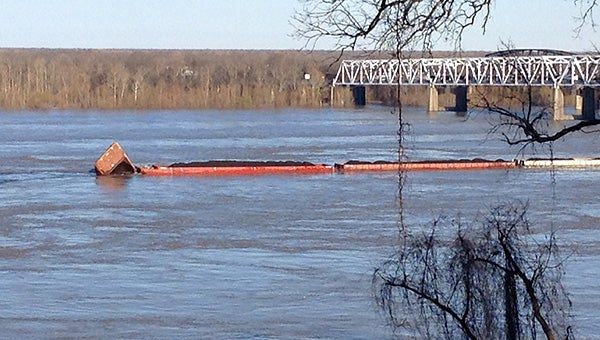Barges break free when vessel hits old U.S. 80 bridge
Published 1:16 pm Tuesday, January 12, 2016

- Tuesday morning a towboat and haul hit the old U.S. 80 bridge, turning several barges loose. Since then, four barges have sunk. (Paul Ingram // for The Vicksburg Post)
Two barges are at the bottom of the Mississippi River and could be there for a long time.
The motor vessel Ron W. Callegan, operated by American Commercial Barge Lines, was traveling southbound on the river when it hit pier four on the old U.S. 80 Bridge at 8:41 a.m. Tuesday.
Lt. Brian Porter of the U.S. Coast Guard public affairs office said out of the 22 coal carrying barges being pulled by the tug, nine broke free and two have sunk. Two other barges that suffered heavy damage were helped to the bank of the river to prevent them from completely sinking, bridge superintendent Herman Smith said.
The other loose barges have been picked up with the help of Ergon Marine and Industrial Supply, emergency management director John Elfer said.
The impact of the collision made the four vessels take on water, causing them to begin to sink. Smith said one sunk about 100 yards south of the I-20 Vicksburg Bridge and the other about 300 yards south of the I-20 Vicksburg Bridge.
“They were below the surface at that point. Now they could have floated much further down the river before they finally rested on the bottom,” Smith said.
The U.S. Army Corps of Engineers will have to send out a survey crew to find the barges and make sure they will not interfere with transportation, Porter said. He said the Coast Guard has restricted maritime traffic between mile markers 438 and 426 to response vessels only. He does not know when it will reopen.
Smith said the barges would have to sit at the bottom of the river until the water recedes. Once the waters goes down, likely sometime this summer, the Coast Guard and the ACBL company will decide when or if the barges will be pulled up, Elfer said.
“You can’t do it in high water,” Smith said.
Smith said the two damaged barges were shoved and sunken on the bank of the river. The company, he thought, should be able to unload the coal they were carrying from those barges.
“They’ll probably get the barges taken to the shipyard to be patched and sent somewhere else for repairs,” Smith said.
Porter said the barges were traveling from Cairo, Ill., to Convent, La.
A bridge engineer from Gulf Engineers and Consultants in Baton Rouge came to conduct a physical inspection of the old U.S. 80 Bridge with Smith. They also checked the bridge from river level on a boat. No damage was found.
Smith said multiple trains sat waiting on the bridge to reopen, one of which started across the bridge just after it was hit and was forced to back up. Rail traffic was halted for a little less than six hours until the safety of the bridge was cleared, Smith said.
The men did look at the I-20 Vicksburg Bridge, but were confident it suffered no damage because it was not hit, Smith said.
The bridge being hit by a barge isn’t unheard of, but it is rare.
“We average one strike a year, but we didn’t have any strikes in 2014 or any in 2015, which is very odd,” Smith said. “We’ve gone a couple times without a strike within a year, but since I’ve been here we have never had two years in a row where we didn’t have a strike.”
He has seen as many as five strikes in one year.
The high floodwaters are a major factor when it comes to these types of accidents.
Smith said when the water is high the current is faster and the barges have to move faster than the current to maintain control of the vessel.
“That creates a much more serious situation,” Smith said.
In Vicksburg specifically, the boats come around a bend before they travel under the bridge making navigation tricky, Smith said.
He said once the boat comes around the bend water hits the boat in the side pushing it back.
“They never point straight. They are always at an angle when they are coming around a bend,” Smith said. “You got a bend just before the bridge and that creates a lot of problems too.”
Smith said the Helena Highway Bridge had a pier hit by a barge Monday night.





